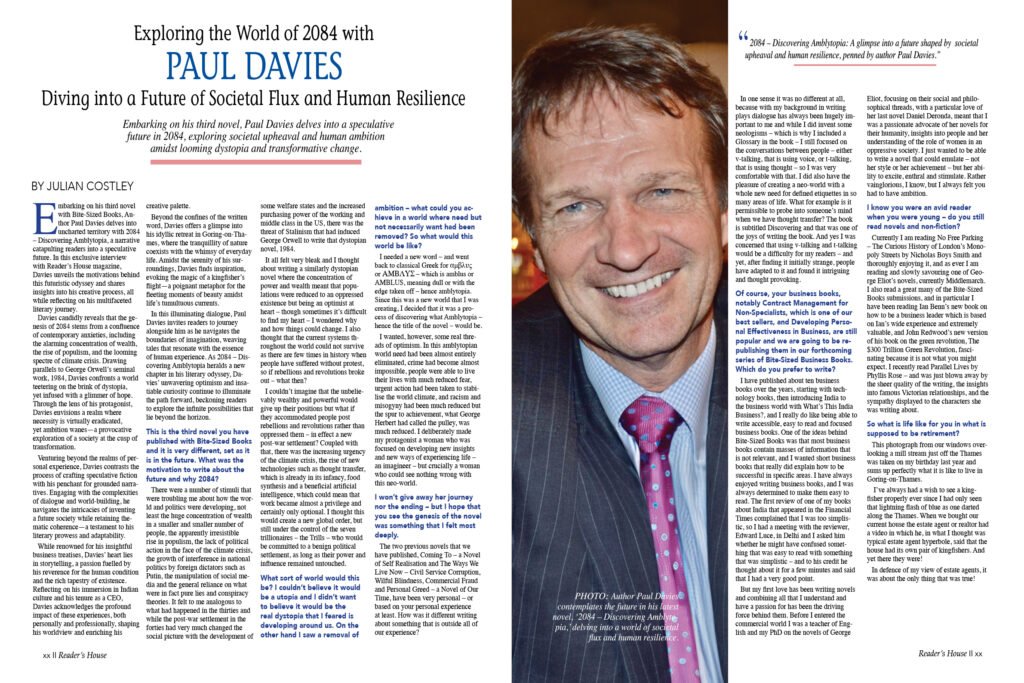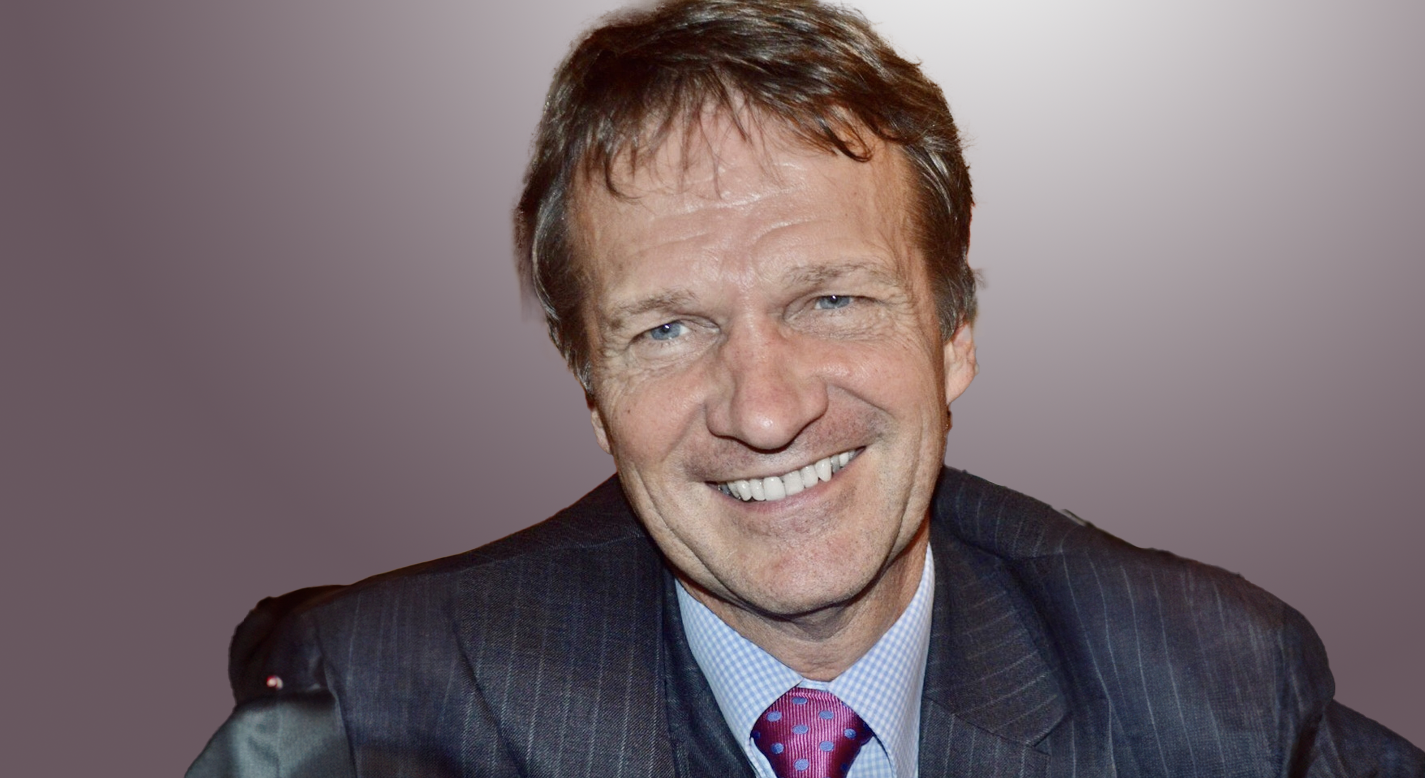Diving into a Future of Societal Flux and Human Resilience
Embarking on his third novel, Paul Davies delves into a speculative future in 2084, exploring societal upheaval and human ambition amidst looming dystopia and transformative change.
Interview by Julian COSTLEY
Embarking on his third novel with Bite-Sized Books, Author Paul Davies delves into uncharted territory with 2084 – Discovering Amblytopia, a narrative catapulting readers into a speculative future. In this exclusive interview with Reader’s House magazine, Davies unveils the motivations behind this futuristic odyssey and shares insights into his creative process, all while reflecting on his multifaceted literary journey.
Davies candidly reveals that the genesis of 2084 stems from a confluence of contemporary anxieties, including the alarming concentration of wealth, the rise of populism, and the looming spectre of climate crisis. Drawing parallels to George Orwell’s seminal work, 1984, Davies confronts a world teetering on the brink of dystopia, yet infused with a glimmer of hope. Through the lens of his protagonist, Davies envisions a realm where necessity is virtually eradicated, yet ambition wanes—a provocative exploration of a society at the cusp of transformation.
Venturing beyond the realms of personal experience, Davies contrasts the process of crafting speculative fiction with his penchant for grounded narratives. Engaging with the complexities of dialogue and world-building, he navigates the intricacies of inventing a future society while retaining thematic coherence—a testament to his literary prowess and adaptability.
While renowned for his insightful business treatises, Davies’ heart lies in storytelling, a passion fuelled by his reverence for the human condition and the rich tapestry of existence. Reflecting on his immersion in Indian culture and his tenure as a CEO, Davies acknowledges the profound impact of these experiences, both personally and professionally, shaping his worldview and enriching his creative palette.
Beyond the confines of the written word, Davies offers a glimpse into his idyllic retreat in Goring-on-Thames, where the tranquillity of nature coexists with the whimsy of everyday life. Amidst the serenity of his surroundings, Davies finds inspiration, evoking the magic of a kingfisher’s flight—a poignant metaphor for the fleeting moments of beauty amidst life’s tumultuous currents.
In this illuminating dialogue, Paul Davies invites readers to journey alongside him as he navigates the boundaries of imagination, weaving tales that resonate with the essence of human experience. As 2084 – Discovering Amblytopia heralds a new chapter in his literary odyssey, Davies’ unwavering optimism and insatiable curiosity continue to illuminate the path forward, beckoning readers to explore the infinite possibilities that lie beyond the horizon.
This is the third novel you have published with Bite-Sized Books and it is very different, set as it is in the future. What was the motivation to write about the future and why 2084?
There were a number of stimuli that were troubling me about how the world and politics were developing, not least the huge concentration of wealth in a smaller and smaller number of people, the apparently irresistible rise in populism, the lack of political action in the face of the climate crisis, the growth of interference in national politics by foreign dictators such as Putin, the manipulation of social media and the general reliance on what were in fact pure lies and conspiracy theories. It felt to me analogous to what had happened in the thirties and while the post-war settlement in the forties had very much changed the social picture with the development of some welfare states and the increased purchasing power of the working and middle class in the US, there was the threat of Stalinism that had induced George Orwell to write that dystopian novel, 1984.
It all felt very bleak and I thought about writing a similarly dystopian novel where the concentration of power and wealth meant that populations were reduced to an oppressed existence but being an optimist at heart – though sometimes it’s difficult to find my heart – I wondered why and how things could change. I also thought that the current systems throughout the world could not survive as there are few times in history when people have suffered without protest, so if rebellions and revolutions broke out – what then?
I couldn’t imagine that the unbelievably wealthy and powerful would give up their positions but what if they accommodated people post rebellions and revolutions rather than oppressed them – in effect a new post-war settlement? Coupled with that, there was the increasing urgency of the climate crisis, the rise of new technologies such as thought transfer, which is already in its infancy, food synthesis and a beneficial artificial intelligence, which could mean that work became almost a privilege and certainly only optional. I thought this would create a new global order, but still under the control of the seven trillionaires – the Trills – who would be committed to a benign political settlement, as long as their power and influence remained untouched.

2084 – Discovering Amblytopia: A glimpse into a future shaped by societal upheaval and human resilience, penned by author Paul Davies.
What sort of world would this be? I couldn’t believe it would be a utopia and I didn’t want to believe it would be the real dystopia that I feared is developing around us. On the other hand I saw a removal of ambition – what could you achieve in a world where need but not necessarily want had been removed? So what would this world be like?
I needed a new word – and went back to classical Greek for αμβλυς or ΑΜΒΛΥΣ – which is amblus or AMBLUS, meaning dull or with the edge taken off – hence amblytopia. Since this was a new world that I was creating, I decided that it was a process of discovering what Amblytopia – hence the title of the novel – would be.
I wanted, however, some real threads of optimism. In this amblytopian world need had been almost entirely eliminated, crime had become almost impossible, people were able to live their lives with much reduced fear, urgent action had been taken to stabilise the world climate, and racism and misogyny had been much reduced but the spur to achievement, what George Herbert had called the pulley, was much reduced. I deliberately made my protagonist a woman who was focused on developing new insights and new ways of experiencing life – an imagineer – but crucially a woman who could see nothing wrong with this neo-world.
I won’t give away her journey nor the ending – but I hope that you see the genesis of the novel was something that I felt most deeply.
The two previous novels that we have published, Coming To – a Novel of Self Realisation and The Ways We Live Now – Civil Service Corruption, Wilful Blindness, Commercial Fraud and Personal Greed – a Novel of Our Time, have been very personal – or based on your personal experience at least. How was it different writing about something that is outside all of our experience?
In one sense it was no different at all, because with my background in writing plays dialogue has always been hugely important to me and while I did invent some neologisms – which is why I included a Glossary in the book – I still focused on the conversations between people – either v-talking, that is using voice, or t-talking, that is using thought – so I was very comfortable with that. I did also have the pleasure of creating a neo-world with a whole new need for defined etiquettes in so many areas of life. What for example is it permissible to probe into someone’s mind when we have thought transfer? The book is subtitled Discovering and that was one of the joys of writing the book. And yes I was concerned that using v-talking and t-talking would be a difficulty for my readers – and yet, after finding it initially strange, people have adapted to it and found it intriguing and thought provoking.
Of course, your business books, notably Contract Management for Non-Specialists, which is one of our best sellers, and Developing Personal Effectiveness in Business, are still popular and we are going to be republishing them in our forthcoming series of Bite-Sized Business Books. Which do you prefer to write?
I have published about ten business books over the years, starting with technology books, then introducing India to the business world with What’s This India Business?, and I really do like being able to write accessible, easy to read and focused business books. One of the ideas behind Bite-Sized Books was that most business books contain masses of information that is not relevant, and I wanted short business books that really did explain how to be successful in specific areas. I have always enjoyed writing business books, and I was always determined to make them easy to read. The first review of one of my books about India that appeared in the Financial Times complained that I was too simplistic, so I had a meeting with the reviewer, Edward Luce, in Delhi and I asked him whether he might have confused something that was easy to read with something that was simplistic – and to his credit he thought about it for a few minutes and said that I had a very good point.
But my first love has been writing novels and combining all that I understand and have a passion for has been the driving force behind them. Before I entered the commercial world I was a teacher of English and my PhD on the novels of George Eliot, focusing on their social and philosophical threads, with a particular love of her last novel Daniel Deronda, meant that I was a passionate advocate of her novels for their humanity, insights into people and her understanding of the role of women in an oppressive society. I just wanted to be able to write a novel that could emulate – not her style or her achievement – but her ability to excite, enthral and stimulate. Rather vainglorious, I know, but I always felt you had to have ambition.
I know you were an avid reader when you were young – do you still read novels and non-fiction?
Currently I am reading No Free Parking – The Curious History of London’s Monopoly Streets by Nicholas Boys Smith and thoroughly enjoying it, and as ever I am reading and slowly savouring one of George Eliot’s novels, currently Middlemarch. I also read a great many of the Bite-Sized Books submissions, and in particular I have been reading Ian Benn’s new book on how to be a business leader which is based on Ian’s wide experience and extremely valuable, and John Redwood’s new version of his book on the green revolution, The $300 Trillion Green Revolution, fascinating because it is not what you might expect. I recently read Parallel Lives by Phyllis Rose – and was just blown away by the sheer quality of the writing, the insights into famous Victorian relationships, and the sympathy displayed to the characters she was writing about.
So what is life like for you in what is supposed to be retirement?
This photograph from our windows overlooking a mill stream just off the Thames was taken on my birthday last year and sums up perfectly what it is like to live in Goring-on-Thames.
I’ve always had a wish to see a kingfisher properly ever since I had only seen that lightning flash of blue as one darted along the Thames. When we bought our current house the estate agent or realtor had a video in which he, in what I thought was typical estate agent hyperbole, said that the house had its own pair of kingfishers. And yet there they were!
In defence of my view of estate agents, it was about the only thing that was true!



